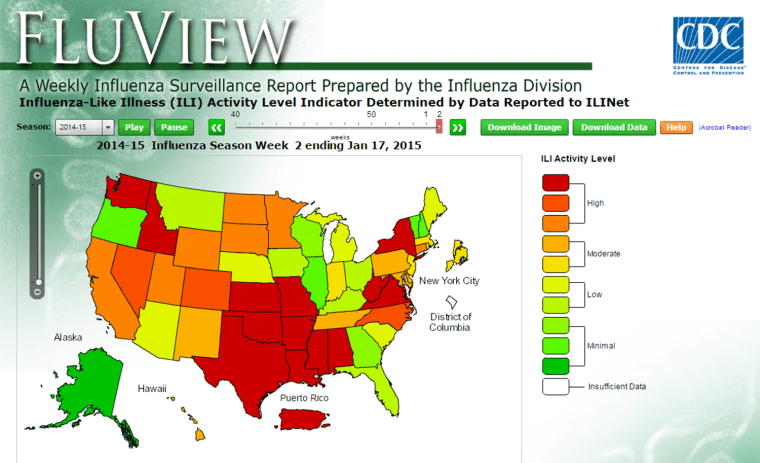Flu season is in full effect, and according to the Centers for Disease Control and Prevention, the flu vaccine has only been 23 percent effective against the virus. (Normally, the rate of prevention is about 65 percent). Influenza has already caused school closures and the proportion of deaths attributed to pneumonia and influenza this year has risen to 9.3 percent.
With those serious flu numbers in mind, Dr. Leigh Vinocur, ER physician from the American College of Emergency Physicians, joined TODAY's Willie Geist to share a few of the ways according to Prevention Magazine that doctors and other medical professionals avoid getting sick. If it works for medical professionals — who are surrounded by sneezing and coughing sick people all day — it could help us stay healthy this winter, too.
Here are some of the tips from Prevention Magazine:
Get the flu shot
The vaccine may not be a great match for the dominant virus circulating right now, but the CDC says people should still get the flu shot because it does work well against strains that may show up at any time.
"The patients I've seen that have been vaccinated and got the flu, (have) much less severe flu, much less complications, so it's still a good idea," Vinocur told TODAY.
And it's not too late to get the shot because the flu season will go at least until March.
Get some fresh air
Recirculated air is not that healthy and, "if it's a sunny day, you get the benefit of vitamin D," said Vinocur. "People that are low in vitamin D get more respiratory infections."
Wash hands
National guidelines say doctors and nurses are supposed to use alcohol-based hand rubs or soap and warm water for at least 15 seconds (like singing "Happy Birthday" twice) before and after every direct contact with a patient, with bodily fluids or with contaminated surfaces or objects.
Hold your breath
Sneezes are the "sharknado" of germs, with the droplets and invisible cloud of viruses traveling 200 times further than once thought, according to MIT research. If someone coughs or sneezes near you, turn away and hold your breath for 10 to 15 seconds, Vinocur advised.
"Stay away from close talkers this season," she said.
Also, keeping your nose warm with a scarf or covering might help your body fight off a cold virus. When we inhale cold air into the nasal cavity, the temperature in the nose decreases and provides a better environment for the cold virus to replicate, Yale researchers suggest.
Avoid excessive alcohol
Skip that extra glass of wine. Alcohol can supress the immune system.
Avoid strenuous exercise
In studies of athletes who did intense workouts, "it stresses your immune system for the next 72 hours," said Vinocur.
And, most importantly: Stay home if you're sick
Recent research found people who stayed home in Mexico City at the start of the H1N1 swine flu pandemic may have altered its course, slowing the spread and perhaps reducing rates of infection.
